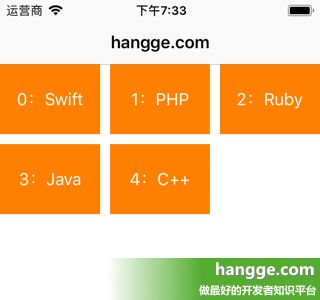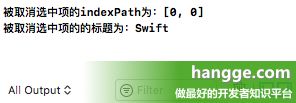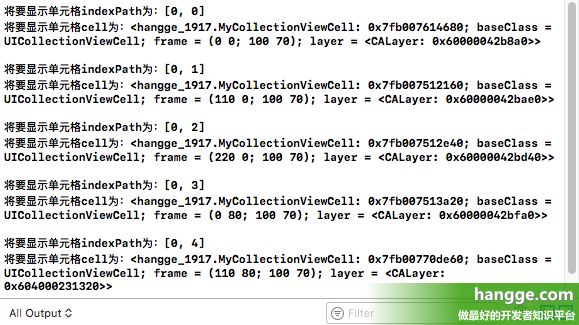一、UICollectionView 的基本用法
1,单个分区的集合视图
(1)首先自定义一个单元格类:
import UIKit
class MyCollectionViewCell: UICollectionViewCell {
var label:UILabel!
override init(frame: CGRect) {
super.init(frame: frame)
//背景设为橙色
self.backgroundColor = UIColor.orange
//创建文本标签
label = UILabel(frame: frame)
label.textColor = UIColor.white
label.textAlignment = .center
self.contentView.addSubview(label)
}
override func layoutSubviews() {
super.layoutSubviews()
label.frame = bounds
}
required init?(coder aDecoder: NSCoder) {
fatalError("init(coder:) has not been implemented")
}
}
(2)主视图控制器代码如下:
import UIKit
import RxSwift
import RxCocoa
class ViewController: UIViewController {
var collectionView:UICollectionView!
let disposeBag = DisposeBag()
override func viewDidLoad() {
super.viewDidLoad()
//定义布局方式以及单元格大小
let flowLayout = UICollectionViewFlowLayout()
flowLayout.itemSize = CGSize(width: 100, height: 70)
//创建集合视图
self.collectionView = UICollectionView(frame: self.view.frame,
collectionViewLayout: flowLayout)
self.collectionView.backgroundColor = UIColor.white
//创建一个重用的单元格
self.collectionView.register(MyCollectionViewCell.self,
forCellWithReuseIdentifier: "Cell")
self.view.addSubview(self.collectionView!)
//初始化数据
let items = Observable.just([
"Swift",
"PHP",
"Ruby",
"Java",
"C++",
])
//设置单元格数据(其实就是对 cellForItemAt 的封装)
items
.bind(to: collectionView.rx.items) { (collectionView, row, element) in
let indexPath = IndexPath(row: row, section: 0)
let cell = collectionView.dequeueReusableCell(withReuseIdentifier: "Cell",
for: indexPath) as! MyCollectionViewCell
cell.label.text = "\(row):\(element)"
return cell
}
.disposed(by: disposeBag)
}
}
2,单元格选中事件响应
(1)当我们点击某个单元格时将其索引位置,以及对应的标题打印出来。
(2)如果业务代码直接放在响应方法内部,可以这么写:
//获取选中项的索引
collectionView.rx.itemSelected.subscribe(onNext: { indexPath in
print("选中项的indexPath为:\(indexPath)")
}).disposed(by: disposeBag)
//获取选中项的内容
collectionView.rx.modelSelected(String.self).subscribe(onNext: { item in
print("选中项的标题为:\(item)")
}).disposed(by: disposeBag)
(3)或者也可以在响应中调用外部的方法:
//获取选中项的索引
collectionView.rx.itemSelected.subscribe(onNext: { [weak self] indexPath in
self?.showMessage("选中项的indexPath为:\(indexPath)")
}).disposed(by: disposeBag)
//获取选中项的内容
collectionView.rx.modelSelected(String.self).subscribe(onNext: {[weak self] item in
self?.showMessage("选中项的标题为:\(item)")
}).disposed(by: disposeBag)
(4)如果想要同时获取选中项的索引,以及内容可以这么写:
Observable.zip(collectionView.rx.itemSelected, collectionView.rx.modelSelected(String.self))
.bind { [weak self] indexPath, item in
self?.showMessage("选中项的indexPath为:\(indexPath)")
self?.showMessage("选中项的标题为:\(item)")
}
.disposed(by: disposeBag)
3,单元格取消选中事件响应
(1)我们可以分别获取被取消项的索引及内容:
//获取被取消选中项的索引
collectionView.rx.itemDeselected.subscribe(onNext: { [weak self] indexPath in
self?.showMessage("被取消选中项的indexPath为:\(indexPath)")
}).disposed(by: disposeBag)
//获取被取消选中项的内容
collectionView.rx.modelDeselected(String.self).subscribe(onNext: {[weak self] item in
self?.showMessage("被取消选中项的的标题为:\(item)")
}).disposed(by: disposeBag)
(2)也可以同时获取:
Observable
.zip(collectionView.rx.itemDeselected, collectionView.rx.modelDeselected(String.self))
.bind { [weak self] indexPath, item in
self?.showMessage("被取消选中项的indexPath为:\(indexPath)")
self?.showMessage("被取消选中项的的标题为:\(item)")
}
.disposed(by: disposeBag)
4,单元格高亮完成后的事件响应
//获取选中并高亮完成后的索引
collectionView.rx.itemHighlighted.subscribe(onNext: { indexPath in
print("高亮单元格的indexPath为:\(indexPath)")
}).disposed(by: disposeBag)
5,高亮转成非高亮完成的事件响应
//获取高亮转成非高亮完成后的索引
collectionView.rx.itemUnhighlighted.subscribe(onNext: { indexPath in
print("失去高亮的单元格的indexPath为:\(indexPath)")
}).disposed(by: disposeBag)
6,单元格将要显示出来的事件响应
//单元格将要显示出来的事件响应
collectionView.rx.willDisplayCell.subscribe(onNext: { cell, indexPath in
print("将要显示单元格indexPath为:\(indexPath)")
print("将要显示单元格cell为:\(cell)\n")
}).disposed(by: disposeBag)
7,分区头部或尾部将要显示出来的事件响应
//分区头部、尾部将要显示出来的事件响应
collectionView.rx.willDisplaySupplementaryView.subscribe(onNext: { view, kind, indexPath in
print("将要显示分区indexPath为:\(indexPath)")
print("将要显示的是头部还是尾部:\(kind)")
print("将要显示头部或尾部视图:\(view)\n")
}).disposed(by: disposeBag)
RxSwift使用详解系列
原文出自:www.hangge.com转载请保留原文链接






